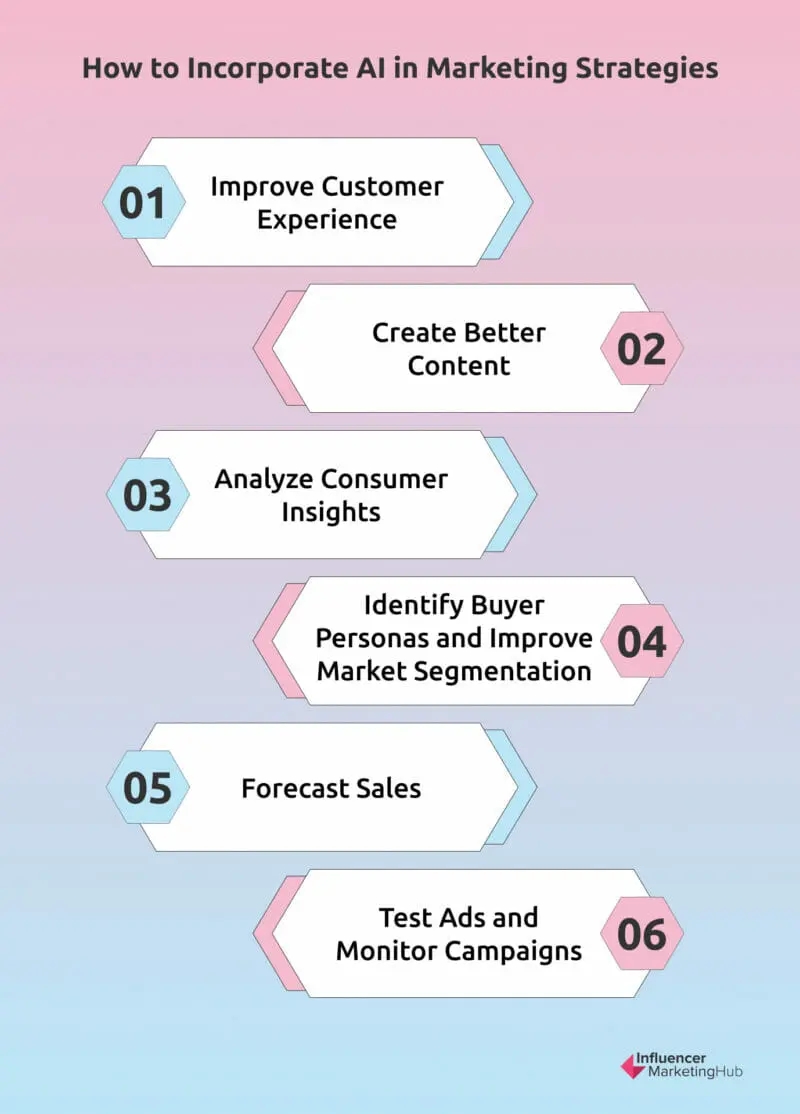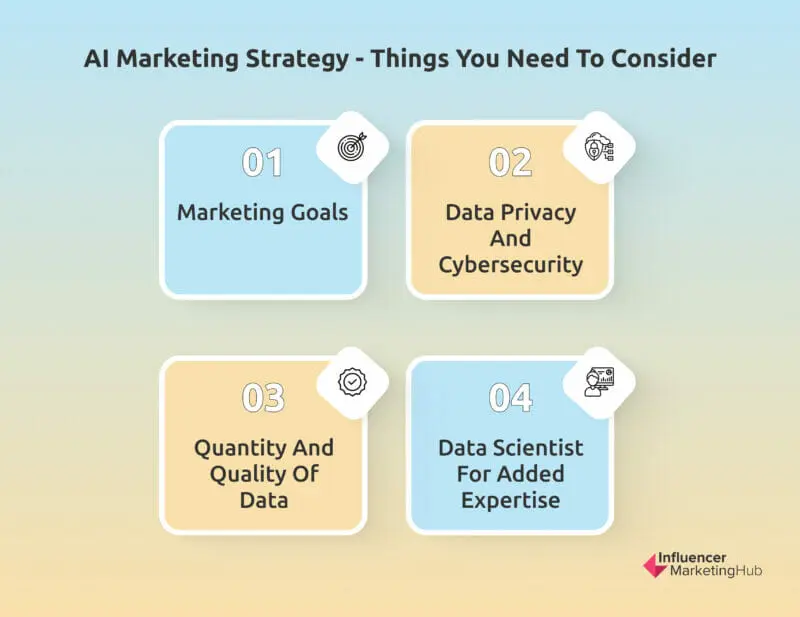Artificial intelligence (AI) has had industry experts buzzing lately with the release of OpenAI’s ChatGPT, an AI tool that can generate human-like responses to questions and prompts. Of course, ChatGPT is hardly a new AI tool. The field of AI goes beyond bots that can answer your questions on science, arts, and philosophy.
To say that AI can enhance your marketing strategies is a simplification. If utilized efficiently, AI-powered tools can ease the workload of marketers and free up brainpower for more creative endeavors. Leave the data analyses and consumer insight gathering for AI—they do a faster job of those anyway—and focus your efforts on bringing together all the information that AI can process, adding a human touch, and creating marketing and advertising campaigns that will boost sales and generate new leads.
Modernize Your Marketing Strategies with AI Technology:
How Can AI Be Used in Marketing?
Globally, the market value for AI in marketing is estimated to grow almost 900% in 8 years, from $12.05 billion in 2020 to $107.5 billion in 2028. As early as 2018, about half of the marketing professionals have reported using AI technology in data analysis. Couple this with the increasing growth of AI in marketing each year, and we can safely assume that more marketing teams are using AI tools in their tasks.
In fact, the chances of marketing professionals not using a form of AI today are very slim. When we say AI, we might think of complex machines like ChatGPT or those Hollywood-type androids that can think, act, and even look like a person. However, in reality, AI in marketing can be something as common as chatbots, e-payments, and even maps and navigation.
But just what are these marketing tasks that professionals use AI for? Isn’t marketing primarily a field where you have to understand people—who may have vastly different tastes? Marketing does require a thorough understanding of people’s behavior and interests. While machines can’t yet fully replicate a human’s range of emotions and behaviors, they can analyze patterns in the behavior of customer groups. They can, to a degree, predict buying decisions and other consumer behavior given a set of data.
The range of tasks that AI can do for marketing is broad. To study them, we can look at AI in marketing through two different lenses: automation and machine learning.
Automation
Task automation is probably an aspect of AI that marketers gladly welcome and use. If you’ve ever had to do a repetitive task like sending birthday greetings, email reminders, or welcome mails to customers, then you’ll perhaps readily employ AI for these. Given a set of instructions or parameters, you can pretty much leave AI to perform tedious tasks that do not require a high level of intelligence. If you are already adept at automation, you can even try more complex automation tools for marketing to make your workload even easier, allowing you to become more productive.
Machine Learning
On the other hand, machine learning is what many people think of when they think about AI. Machine learning is simply a branch of artificial intelligence that refers to the ability of a machine to analyze data and draw out inferences to imitate human thinking. While task automation only involves doing the same things over and over again, machine learning—as the name implies—is a higher order of AI, where software applications can predict outcomes by “learning” about previous results.
Think of the times where you’ve searched something online. The next time you check your social media, you suddenly see advertisements relating to the product or service you searched. This is a type of machine learning where algorithms learn your behavior (researching a particular product), and from there, it predicts the type of ads you would most want to see and respond to.
Incorporating AI in Marketing Strategies
Marketing covers a whole range of jobs and objectives. As such, AI has many different uses and applications in the field. Let’s take a look at some of the AI marketing strategies that you can use to optimize your campaigns.
Improve Customer Experience
Marketing is all about the customer—their needs, wants, interests, and behaviors. Improving your customer’s experience is a part of marketing your brand as a trustworthy, credible, customer-centric business that people would want to support.
This is where AI technologies like chatbots are useful. When customers have questions, a chatbot can respond instantly to the most common questions. Anything they can’t answer, they can pass off to a real person. Chatbots allow businesses to respond quickly to customers before they lose interest without needing to hire dozens of customer service representatives.
Good customer experience also entails personalization. Different customers have different values, interests, and beliefs. So even if they look for similar products or services, they will be drawn to different things and will make decisions based on different factors. It is good practice to personalize marketing efforts per customer segment—and even per individual, if resources allow it—so as to give relevant ads and other marketing material for your audience. Less irrelevant ads equals a better customer experience. For the business side, personalization will attract more potential customers.
Create Better Content
AI is one of the content marketing trends that are popular this year. With AI tools such as ChatGPT gaining prominence today, it would be a mistake for marketers not to harness its full potential. Content creation need not be shouldered fully by human staff; and it should not be entirely reliant on AI too. AI-generated content for marketing can unburden your marketing team’s workload by providing support. When you use AI to create content, it does not necessarily mean that you're churning out all of it yourself. One of the simplest ways to use AI for content marketing is for copywriting and generating ideas. This can significantly support content writers, many of whom may struggle or take a long time to think of a topic to write about, or an interesting theme for a social media post.
You can think of AI writing tools as a friend whom you can ask for help when you have writer’s block. Anything the bot generates, you can play with, tweak, edit, or use as inspiration for your next marketing content.
Another resourceful way to use AI for content creation is to help you with compiling and organizing research data. This can help writers and creators streamline the research process, plus save time and energy by doing the online searches for relevant information. Writers can then focus on putting these all together in a coherent piece fit for marketing.
Finally, marketing teams can also use AI for editing and proofreading. Your content can still come entirely from your team, but AI can check for grammatical errors and typos.
Analyze Consumer Insights
Feedback is at the heart of every marketing campaign. Campaigns should be dynamic, adjusting according to public sentiment or to the feedback of its loyal customers. AI is a big help to marketers in this regard, with the ability to collect and process a large amount of data.
Businesses that make decisions based on data would likely be at the forefront of AI in marketing. AI technology is amazing at providing insights based on customer data such as behavior patterns, feedback from surveys, even social media comments.
Moreover, AI can identify online trends in real time, so brands can act faster and stay ahead of the competition. And as marketers know, consumers preferences and behavior are not constant and fixed. Opinions can switch at the drop of a hat, and AI can be a useful ally in spotting these changes quickly.
Identify Buyer Personas and Improve Market Segmentation
Buyer personas are important when creating a marketing plan. You need to know who your target customers are, their hobbies and interests, where they are, and other things that can help you personalize marketing campaigns for them.
Aside from analyzing consumer insights for data-driven decisions, AI can also use them to create new or modify existing buyer personas. It can help you make more intelligent market segmentation to improve your marketing strategy.
Forecast Sales
A good part of running a successful campaign hinges on the business’ ability to forecast demand. A lot of things depend on this forecast, and marketing is one of them. To create a clear and effective strategy, marketers need to work around the sales forecast for a given period. AI can provide this using predictive analysis.
Based on previous sales performance, customer feedback, market trends, and other factors, the technology comes up with a sales forecast. Marketing teams can then adjust their strategy to help products or services that need a bit more marketing magic or strengthen their top-performing products.
Test Ads and Monitor Campaigns
AI is likewise very useful in running ad tests and monitoring campaigns. There are AI tools available nowadays that can perform ad tests and analyze results for you, ensuring that the final output of the campaign is the most effective one.
Marketing doesn't end once a campaign is up and running; it is very important to monitor each campaign’s performance to see if it is effective. AI tools can automate this process so marketers can focus on the analysis and adjust as necessary. This saves time and money for businesses and frees up manpower for more creative pursuits.
How to Start an AI Marketing Strategy
The good thing about artificial intelligence is that it’s not just one discipline. The wide range of domains under AI means that you can start using AI tools in marketing even with little to no knowledge of the science of AI.
Simple rule-based AI applications and tools are a good place to start if you are beginning to use AI. You can automate basic repetitive tasks first, then work your way up. For content, you can start with AI-powered proofreading and editing tools if you are still unsure on how to effectively use NPL tools like ChatGPT for content generation.
An AI marketing strategy is all about efficiency and effectiveness. The aim is not to replace your marketing team with bots; rather, we want a powerful collaboration between people and AI to achieve the best marketing results as possible.
Some of the things you need to keep in mind when you create an AI marketing strategy are the following:
Enhance Your Marketing Strategies with AI
We’ve seen how marketers can leverage AI to improve productivity and efficiency. In today’s fast-paced world, AI allows marketing teams to respond immediately to shifting trends, public opinion, and online sentiments. Using AI in your marketing strategy can increase your ROI, boosting sales and generating more leads. It can help you make better decisions, ones that are based on numbers and factual information instead of speculation.
Modernizing your marketing strategies with AI technologies comes with a lot of options, so it’s best to plan and perform your due diligence before implementing anything. You have many different options when it comes to AI tools for marketing, so make sure that your requirements and resources are a match to the tools that you will use. Enhance your marketing strategies with the proper AI technologies that will take your business to the next level.





